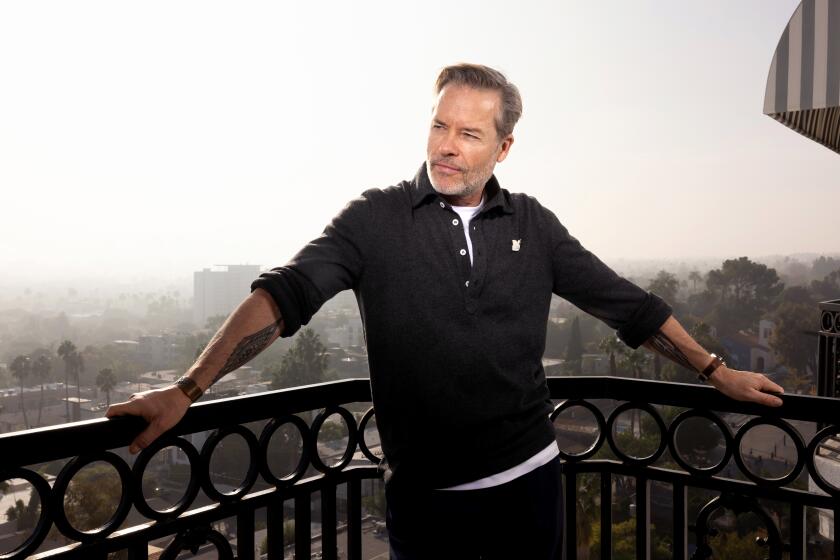President Trump isn’t happy about the Oscar for ‘Parasite.’ What movies does he like?
- Share via
At a rally Thursday in Colorado Springs, Colo., President Trump expressed his displeasure that director Bong Joon Ho’s class satire “Parasite” won the best picture prize at this year’s Oscars, suggesting that the notion of a South Korean film earning the film academy’s highest honor was somehow preposterous on its face, if not downright offensive.
Never mind that “Parasite” was one of the most acclaimed films of 2019, racked up numerous festival, critics’ and guild honors and has broken through at the global box office in a way that few foreign-language films ever have. And never mind that, by his own admission, Trump hasn’t actually seen Bong’s genre-scrambling thriller, which explores the gap between rich and poor and which became the first foreign-language film to win the academy’s top prize.
“How bad were the Academy Awards this year?” Trump asked the crowd to a chorus of boos. “The winner is … a movie from South Korea! What the hell was that all about? We got enough problems with South Korea with trade. On top of that, they give [Bong] best movie of the year?”
(Through a representative, Bong declined to respond to Trump’s comments. The U.S. distributor of “Parasite,” Neon, tweeted snarkily of the president’s apparent aversion to subtitled movies, “Understandable, he can’t read.”)
All of this raises an obvious question: If Trump isn’t happy with the academy’s selection of “Parasite,” what kind of movie would he like to see celebrated? What, in his mind, would make the Oscars great again?
Though he has offered endless commentary on the TV business over the decades, Trump has less frequently shared his feelings about movies. Nor, as president, has he hosted as many screenings at the White House as some of his predecessors, such as Bill Clinton, Barack Obama or Jimmy Carter, who screened 480 films during his presidency.
Among the handful of films reported to have been screened at the Trump White House are Pixar’s “Finding Dory,” the Pentagon Papers drama “The Post,” the P.T. Barnum musical “The Greatest Showman” and the comic book smash “Joker.” (Read into that list what you will.)
In his Colorado Springs speech, Trump waxed nostalgic about the films of Hollywood’s golden age, which he presumably regards as inherently more Oscar-worthy than “Parasite.” “Let’s get ‘Gone With the Wind’ back, please? ‘Sunset Boulevard,’ ” he said. “So many great movies.”
In fact, before following his father into real estate, Trump at one point harbored dreams of being a studio mogul not unlike the ones who had made those movies. After graduating from New York Military Academy in 1964, Trump briefly considered attending USC’s film school.
“I was attracted to the glamour of the movies, and I admired guys like Sam Goldwyn, Darryl Zanuck and most of all Louis B. Mayer,” he and Tony Schwartz wrote in the 1987 bestseller “Trump: The Art of the Deal.” “But in the end I decided real estate was a much better business.”
(Compared with his massive presence in New York, Trump would go on to become a relatively minor player in Los Angeles, telling The Times in 1988 that he feared getting too involved in the L.A. real estate business out of a concern over “the whole earthquake situation.”)
Over the years, Trump — who has made cameos as himself in numerous films such as “Home Alone 2: Lost in New York,” “Zoolander” and Woody Allen’s “Celebrity” — has expressed his admiration for an eclectic range of films.
He has heralded tough-guy movies like “Rambo” and “Death Wish,” singling out the president-as-action-hero Harrison Ford film “Air Force One” as a particular favorite. He has spotlighted films starring Jon Voight, an outspoken supporter, like “Midnight Cowboy” and “Deliverance.” And he has shown a particular, if unsurprising, fondness for movies that showcase his real estate properties, saying in a 2012 video review of “The Dark Knight Rises,” “The movie is really worthwhile seeing — and most importantly Trump Tower, my building, plays a role.”
Asked by Movieline in 2012 to list his five favorite films of all time, Trump named Orson Welles’ “Citizen Kane,” the Sergio Leone spaghetti western “The Good, the Bad and the Ugly,” “Gone With the Wind” and two gangster movies, “GoodFellas” and “The Godfather” — a fairly conventional list, albeit one with a noticeable tilt toward violence and retribution. (Traits he may even appreciate in “Parasite,” should he ever watch it.)
In a 2002 interview with documentary filmmaker Errol Morris, Trump elaborated on his love for “Citizen Kane” and reflected on what could be learned from Welles’ portrait of publishing tycoon Charles Foster Kane. “ ‘Citizen Kane’ was really about accumulation,” Trump said. “At the end of the accumulation, you see what happens, and it’s not necessarily all positive.”
But while “Citizen Kane” is unanimously hailed as one of the greatest films of all time, Trump’s cinematic tastes aren’t all so refined. On the other end of the spectrum, in a 1997 New Yorker profile, he proclaimed Jean-Claude Van Damme’s 1988 martial arts action film “Bloodsport” “an incredible, fantastic movie.”
During a flight on his private jet, as described by the profile’s author, Mark Singer, Trump popped the movie into the VCR and zeroed in on his favorite scenes: “By assigning to his son the task of fast-forwarding through all the plot exposition — Trump’s goal being ‘to get this two-hour movie down to forty-five minutes’ — he eliminated any lulls between the nose hammering, kidney tenderizing, and shin whacking.”
“Bloodsport,” you may recall, failed to receive a single Oscar nomination.
More to Read
Only good movies
Get the Indie Focus newsletter, Mark Olsen's weekly guide to the world of cinema.
You may occasionally receive promotional content from the Los Angeles Times.











